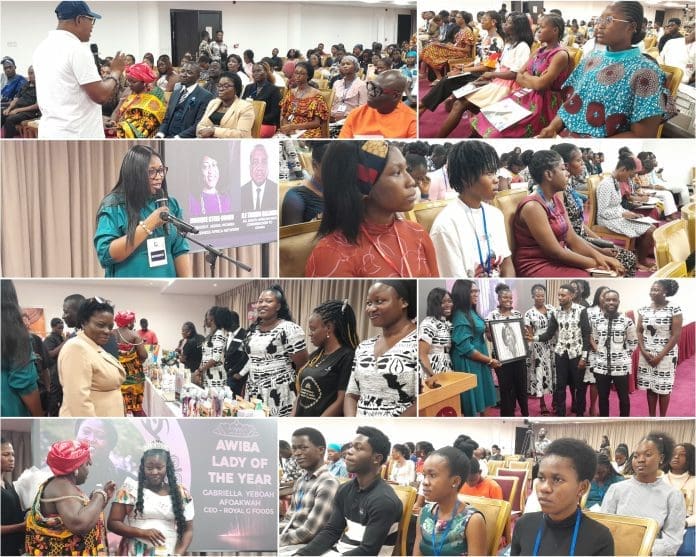Six female entrepreneurs celebrated at 5th AWIBA Network Conference in Accra as leaders urge investment in women-led enterprises.
The Aiding Women in Business Africa (AWIBA) Network on Saturday hosted its fifth annual conference, exhibition, and awards ceremony in Accra under the theme “AWIBA 2025: Empowering Women, Building Nations.”
Six outstanding female entrepreneurs were honored with plaques, certificates, and special gift hampers in recognition of their excellence in business. The coveted AWIBA Lady of the Year 2025 award went to Gabrielle Yeboah Afoajwa, Chief Executive Officer of Royal G Foods, for her leadership and innovation in Ghana’s agro-processing industry.
In her opening remarks, Monique Kyere-Duodo, president of the AWIBA Network, reaffirmed the organization’s mission to empower young women to become successful entrepreneurs.
“Empowering a woman is a powerful catalyst for community transformation and nation-building,” Kyere-Duodo said. “When a woman is empowered, she nurtures healthy families, builds stronger communities, and creates a ripple effect that benefits generations to come.”
Founded seven years ago, AWIBA has grown into a thriving network of more than 400 women entrepreneurs and aspiring business leaders across Ghana. The network has helped over 60 women launch successful enterprises through mentorship, skills training, and financial guidance.
The AWIBA Excellence Awards, introduced as part of the network’s empowerment initiatives, aim to motivate young entrepreneurs navigating Ghana’s often challenging startup environment. Kyere-Duodo urged both public and private stakeholders to invest in women-owned businesses.
“Sometimes, all a young woman needs to start a business is a little capital and encouragement,” she said. “With the right support, young women can build enterprises, create jobs, and drive meaningful change.”
Government and UN Leaders Echo Support for Women’s Empowerment
Delivering a keynote address, Dr. Ishmeal Nii Amanor Dodoo, Director and Head of Partnerships and Markets at the 24-Hour Economy Secretariat, stressed the critical role women play in Ghana’s industrialization and economic growth.
“Women are the backbone of Ghana’s economy,” Dr. Dodoo said. “From agribusiness to manufacturing and trade, they have always been our real entrepreneurs. The 24-hour economy will deliberately empower women to occupy key positions in production, distribution, and innovation.”
He further revealed plans for a ₵1.2 billion to ₵1.5 billion SME facility under the 24-Hour Economy program to provide low-interest, non-collateralized loans to micro, small, and medium enterprises, including women-led startups.
“This facility will be a game-changer,” Dr. Dodoo noted. “By pooling resources and forming associations, women entrepreneurs can access patient capital to expand their businesses and create jobs.”
Also addressing the event, Dr. Afua Ansre, Senior Gender Specialist at UN Women, emphasized the need to eliminate all forms of discrimination against women to unlock their full economic potential.
“We must create an environment where both men and women can aspire to their fullest potential,” she said. “Our fight is not for sameness, but for fairness and opportunity.”
Dr. Ansre cited international frameworks such as the Convention on the Elimination of All Forms of Discrimination Against Women (CEDAW) and the Beijing Platform for Action, calling them the foundation for global and national efforts to advance women’s rights and economic inclusion.
Building the Future Together
As the conference concluded, the resounding message was clear: investing in women entrepreneurs is investing in Africa’s future. The AWIBA Network continues to serve as a bridge — connecting young women with opportunities, mentorship, and visibility.
“The youth of Ghana are not lazy, and our young women are not lazy,” Kyere-Duodo declared passionately. “They only need a conducive environment and a word of encouragement to thrive. AWIBA exists to give them both.”
The event closed with an exhibition showcasing products from women-led startups across sectors including food processing, fashion, technology, and crafts, underscoring the innovation and resilience of Ghana’s next generation of business leaders.
By [KingsleyAsiedu]
Source: newsghana.com.gh











